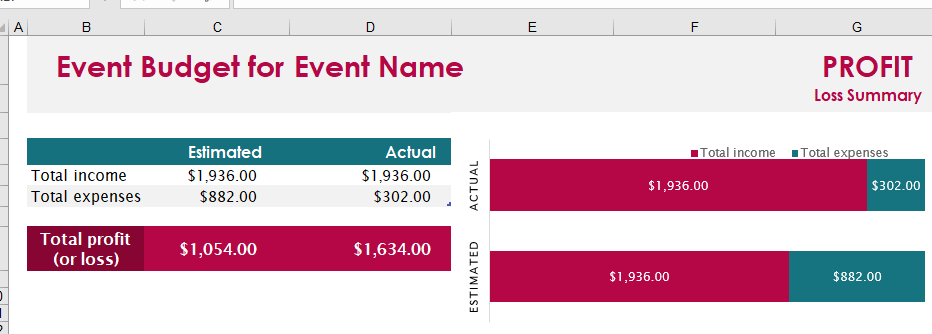Event Budget Template
Budgeting is a vital skill that plays a key role in managing event expenses and maintaining financial control. While few people fully master budgeting, applying basic budgeting principles can significantly improve how event costs are planned, tracked, and managed.
Planning an event without a budget is like traveling without a roadmap -you never truly know where you are headed. Successful event planners prepare a detailed budget to anticipate both expected and unexpected expenses. Although following a structured budget may seem challenging at first, it is a powerful tool that helps control costs and ensures the event remains financially successful.
Importance of an Event Budget Worksheet
Maintaining a budget provides a clear financial roadmap that helps you track where every cent is spent. IT allows you to identify potential overspending and manage event expenses more effectively. As financial needs and responsibilities change, a well-planned event budget can be adjusted to reflect these changes. Regularly reviewing and updating the budget gives you better control over event finances and supports informed decision-making based on current requirements.
Tracking Estimated vs Actual Event Expenses
When preparing an event budget, expenses are estimated in advance. These estimates can later be compared with actual costs to identify differences, known as variances. Analyzing these variances helps highlight areas of overspending and allows timely corrective actions to be taken.
In family settings, conflicts can often arise due to excessive or unplanned spending. This is why prioritizing expenses is essential when planning an event. An event budget sheet helps distinguish between necessary and non-essential costs, making it easier to focus on what truly matters and avoid unnecessary financial stress.
Importance of Budgeting in Event Planning
Budgeting is a crucial part of the event planning process. A well-executed event is financially organized and remains within its budget limits. The amount of available funding usually determines the overall event budget. When the budget is large, organizing the event is relatively easier. However, when funds are limited, planning becomes more challenging and requires careful budgeting and effective resource management to ensure the event’s success.
At the initial stage of event planning, it is essential to estimate the total cost of all major expenses. These typically include catering, venue rental, equipment, and guest-related costs.
One of the most crucial aspects of successful event planning is adhering to a well-structured budget. To manage this effectively, an event budget sheet should be prepared in advance. The sheet should include the total estimated cost along with a detailed breakdown of each expense category.
Detailed Cost Breakdown for Accurate Budgeting
Each major cost often includes several subcategories. Providing detailed entries for every item enhances transparency and helps calculate variances between estimated and actual spending. This allows for better financial control and informed decision-making throughout the event planning process.
Event Budget Planning Using Templates
When organizing an event, one of the most important steps is to prepare a practical and well-structured budget. To ensure smooth execution, using digital tools like Excel or other template software can be extremely helpful. Many pre-formatted event budget templates are available online, allowing you to customize them to suit your specific needs effortlessly.
These templates offer flexible features that let you design your budget layout according to your preferences. A typical event budget template includes the following components:
- Name of Each Item involved in event purchases
- Total Estimated Cost for each item or category
- Detailed Descriptions of items and activities related to the event
These tools help keep your event planning organized and within financial limits.
Effective Event Budget Planning for Business Operations
In the context of business operations, an event manager prepares a comprehensive event budget to forecast potential gains or losses associated with organizing an event. This budget includes all major costs such as venue selection, date planning, and cuisine choices, which are combined to provide a projected estimate of total expenditures. The purpose of this process is to establish a predictable financial outlook, helping ensure the event remains within budget and delivers successful outcomes. While budgeting may require considerable time and effort, understanding certain key aspects can make it more effective and efficient.
If the budget forecast indicates a potential loss, it becomes easier to restructure plans and reduce unnecessary expenses early in the process. A realistic estimation of the number of attendees also plays a crucial role in managing the budget accurately.
Additionally, a well-prepared event budget should account for unforeseen circumstances, such as unexpected cancellations, delays, or emergencies. Planning with these contingencies in mind can protect the event from sudden financial strains.
Common expense categories to include in an event budget are:
- Travel and transport
- Salaries and staff wages
- Stationery and supplies
- Insurance
- Venue rental
- Accommodation
- Food and beverages
To streamline the process, consider using free online templates to create a clear and professional event budget sheet. Plan with awareness and attention to detail to ensure a smooth and cost-effective event execution.
Here is the sample template for help.
- Children’s Daily Activity Reward Sheet
- Winter Clothing & Gear Budget Sheet
- Winter Utility Expense Template
- Fuel & Equipment Sheets
- Monthly Attendance Sheet for Employees
- Student Entry & Exit Log
- Gantt Chart for Smaller Projects
- Behavior Log of Child for Schools
- Loan Repayment Tracker
- Product Sales Tracker Template
- Debit Memo Template for Excel
- Winter Attire Inventory
- Financial Projections Worksheet
- Employee Absence Tracker
- Weekly Sales Report Template
← Previous Article
Event Schedule TemplatesNext Article →
Home Schooling Study Record Template
Leave a Reply